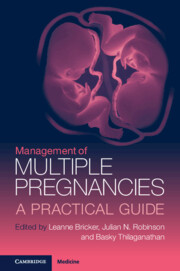Book contents
- Management of Multiple Pregnancies
- Management of Multiple Pregnancies
- Copyright page
- Contents
- Editors
- Contributors
- Chapter 1 Epidemiology of Multiple Pregnancy
- Chapter 2 Assisted Conception and Multiple Pregnancy
- Chapter 3 Zygosity, Chorionicity and Amnionicity
- Chapter 4 Multifetal Pregnancy Reduction
- Chapter 5 Gestational Dating in Multiple Pregnancy
- Chapter 6 Screening for Fetal Aneuploidy in Multiple Pregnancy
- Chapter 7 Screening for Fetal Abnormality in Multiple Pregnancy
- Chapter 8 Screening and Diagnosis of Complications of Shared Placentation
- Chapter 9 Invasive Prenatal Diagnosis in Multiple Pregnancy
- Chapter 10 Conjoined Twinning
- Chapter 11 Management of Discordant Fetal Anomaly
- Chapter 12 Single and Double Fetal Loss in Twin Pregnancy
- Chapter 13 Management of Twin–Twin Transfusion Syndrome
- Chapter 14 Management of Twin Anaemia-Polycythaemia Sequence
- Chapter 15 Management of Twin-Reversed Arterial Perfusion (TRAP) Sequence
- Chapter 16 Management of Fetal Growth Pathology in Multiple Pregnancy
- Chapter 17 Management of Monoamniotic Twins
- Chapter 18 Maternal Complications in Multiple Pregnancy
- Chapter 19 Risk Assessment and Screening for Preterm Birth in Multiple Pregnancy
- Chapter 20 Prevention of Preterm Birth in Multiple Pregnancies
- Chapter 21 Optimal Antenatal Care in Multiple Pregnancy
- Chapter 22 Triplet and Higher-Order Pregnancy
- Chapter 23 Timing of Delivery in Multiple Pregnancy
- Chapter 24 Mode of Delivery in Multiple Pregnancy
- Chapter 25 Practical Management of Vaginal Delivery in Multiple Pregnancy
- Chapter 26 Neonatal Care Aspects of Multiple Pregnancy
- Chapter 27 Lifestyle Considerations for Multiple Pregnancy
- Chapter 28 Emotional and Mental Well-Being in Multiple Pregnancy
- Chapter 29 New Frontiers in Multiple Pregnancy Management
- Chapter 30 Multiple Pregnancy Resources for Professionals and the Public
- Chapter 31 Obstetric Anaesthesia in Multiple Pregnancy
- Index
- Plate Section (PDF Only)
- References
Chapter 17 - Management of Monoamniotic Twins
Published online by Cambridge University Press: 11 October 2022
- Management of Multiple Pregnancies
- Management of Multiple Pregnancies
- Copyright page
- Contents
- Editors
- Contributors
- Chapter 1 Epidemiology of Multiple Pregnancy
- Chapter 2 Assisted Conception and Multiple Pregnancy
- Chapter 3 Zygosity, Chorionicity and Amnionicity
- Chapter 4 Multifetal Pregnancy Reduction
- Chapter 5 Gestational Dating in Multiple Pregnancy
- Chapter 6 Screening for Fetal Aneuploidy in Multiple Pregnancy
- Chapter 7 Screening for Fetal Abnormality in Multiple Pregnancy
- Chapter 8 Screening and Diagnosis of Complications of Shared Placentation
- Chapter 9 Invasive Prenatal Diagnosis in Multiple Pregnancy
- Chapter 10 Conjoined Twinning
- Chapter 11 Management of Discordant Fetal Anomaly
- Chapter 12 Single and Double Fetal Loss in Twin Pregnancy
- Chapter 13 Management of Twin–Twin Transfusion Syndrome
- Chapter 14 Management of Twin Anaemia-Polycythaemia Sequence
- Chapter 15 Management of Twin-Reversed Arterial Perfusion (TRAP) Sequence
- Chapter 16 Management of Fetal Growth Pathology in Multiple Pregnancy
- Chapter 17 Management of Monoamniotic Twins
- Chapter 18 Maternal Complications in Multiple Pregnancy
- Chapter 19 Risk Assessment and Screening for Preterm Birth in Multiple Pregnancy
- Chapter 20 Prevention of Preterm Birth in Multiple Pregnancies
- Chapter 21 Optimal Antenatal Care in Multiple Pregnancy
- Chapter 22 Triplet and Higher-Order Pregnancy
- Chapter 23 Timing of Delivery in Multiple Pregnancy
- Chapter 24 Mode of Delivery in Multiple Pregnancy
- Chapter 25 Practical Management of Vaginal Delivery in Multiple Pregnancy
- Chapter 26 Neonatal Care Aspects of Multiple Pregnancy
- Chapter 27 Lifestyle Considerations for Multiple Pregnancy
- Chapter 28 Emotional and Mental Well-Being in Multiple Pregnancy
- Chapter 29 New Frontiers in Multiple Pregnancy Management
- Chapter 30 Multiple Pregnancy Resources for Professionals and the Public
- Chapter 31 Obstetric Anaesthesia in Multiple Pregnancy
- Index
- Plate Section (PDF Only)
- References
Summary
In monochorionic monoamniotic twin pregnancies, two fetuses share a single placenta and a single amniotic cavity. This unique anatomic configuration, although rare, puts them at high risk for a number of complications including structural anomalies, twin-twin transfusion syndrome, selective intra-uterine growth restriction and cord accidents. Early diagnosis and patient counselling are therefore crucial. Level 1 evidence on the optimal management of monoamniotic twins is lacking, but observational studies provide some guidance for best practice. In uncomplicated monoamniotic twins, after viability, fetal mortality is less than 5% if close surveillance is initiated. This can be done in either an inpatient or outpatient setting. If all goes well, monoamniotic twins should be delivered from 33 weeks’ gestation as, at that timepoint, the risk of in utero death is larger than the risk of (non-respiratory) neonatal complications.
Keywords
- Type
- Chapter
- Information
- Management of Multiple PregnanciesA Practical Guide, pp. 181 - 187Publisher: Cambridge University PressPrint publication year: 2022

